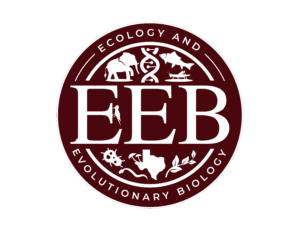Doctor of Philosophy (Ph.D.) in Ecology and Evolutionary Biology
Admissions
Prospective students may apply to the Interdisciplinary Degree Program in Ecology & Evolutionary Biology through the TAMU Office of Graduate Studies. The overall graduate admission criteria are based on the entire record of the applicant and availability of institutional resources. Admission to the Interdisciplinary Degree Program in EEB will be based upon the following criteria:
- Hold a four-year baccalaureate degree from a college or university of recognized standing (i.e., a U.S. or foreign degree recognized as equivalent to a baccalaureate degree from an accredited institution in the U.S.),
- Show promise of intellectual and academic ability, as evidenced by a minimum of three letters of recommendation from persons capable of judging the applicant’s capabilities, a Statement of Purpose essay, an overall evaluation of the student’s transcript, and the grade point average in the last 60 hours of coursework.
- Demonstrate research aptitude in the form of prior research experience, presentations at professional meetings, and/or publications in the scientific literature.
- An applicant from another country seeking admission to graduate studies must demonstrate the ability to read, write, speak, and understand the English language. Prospective students whose native language is not English must take the Test of English as a Foreign Language (TOEFL), which is administered by the Educational Testing Service in over 200 centers around the world. All applicants from non-English-speaking countries must present a computer-based TOEFL score of at least 213 to be admitted to graduate studies at the University.
- Importantly, each EEB applicant must contact a prospective faculty sponsor before the application deadline. That faculty sponsor must provide a letter of support before the applicant’s materials will be reviewed. A student will only be admitted if an EEB core faculty member agrees to serve as committee chair for the student.
The EEB GRAC (Graduate Recruiting and Admissions Committee) will evaluate each application. Funding will be allocated to invite the top 10 candidates each year for in-person interviews on campus. The GRAC will also evaluate transfer students from other TAMU graduate programs according to the criteria outlined above.
Degree Requirements
The doctoral program provides a broad foundation in EEB through a first-year core sequence, as well as training in the quantitative skills required to conduct cutting-edge research. The program is distinctive in that students will be exposed to an interdisciplinary array of approaches to thinking about ecology and evolution, from faculty and students associated with different scientific emphases and a range of connections to real-world applications. Students entering with Master’s and with undergraduate degrees will both be required to follow the first-year core course sequence; students entering with a Master’s will be required to take fewer seminar hours, elective courses, and dissertation credits.
Students entering with an undergraduate degree:
| Category | Semester Credit Hours |
| Required EEBL Courses | 15 |
| Prescribed Electives | 9 |
| Free Electives | 24 |
| Dissertation | 48 |
| Other | 0 |
| TOTAL | 96 |
Students entering with a Master’s degree or equivalent:
| Category | Semester Credit Hours |
| Required EEBL Courses | 12 |
| Prescribed Electives | 6 |
| Free Electives | 14 |
| Dissertation | 32 |
| Other | 0 |
| TOTAL | 64 |
Curriculum
| Required Courses | SCH |
| First-year Graduate Seminar (EEBL 610) | 1 |
| Seminar (EEBL 681) | 6 (entering with BS/BA) |
| Populations, Communities & Ecosystems (EEBL/WFSC 689) |
3 |
| Evolution (BIOL 610) | 3 |
| EEB Journal Club (EEBL 681) | 2 |
| Prescribed Elective Courses (students entering from BS/BA) | SCH |
| Minimum of 9 credits total in at least two different departments from the following categories (complete list in Appendix IV.A): Quantitative, Ecology, and Evolution | 9 |
| Prescribed Elective Courses (students entering from MS/MA) | SCH |
| Minimum of 6 credits total in at least two different departments from two of the three following categories (complete list in Appendix IV.A): Quantitative, Ecology, and Evolution | 6 |
| Free Elective Courses | SCH |
| Students will choose free electives in conjunction with their committee chair and subject to approval of the research committee; free electives may include formal courses or dissertation hours. | 24 (entering with BS/BA); 14 (entering with MS/MA) |
Candidacy/Dissertation Schedule and Requirements
EEB students will be expected to fulfill the following requirements. Any exceptions must be approved by the Program Chair through the Coordinator and the Curriculum Chair.
- Successfully complete the two-semester EEB Core Course sequence (EEBL 601-608) in the first year.
- Register for the weekly EEB seminar (EEBL 681) while in residence in College Station.
- Successfully complete the First Year Graduate Seminar (EEBL 610) in the first semester.
- Establish a research committee and file a graduate degree plan by the end of the second semester. This committee should conform to the general requirements of Texas A&M University (page 163 of the 2010-2011 TAMU Graduate Catalog). At least one half of a student’s research committee must be EEB core faculty with primary appointments spanning at least two academic departments.
- At least 2 semesters of teaching experience is strongly recommended. We also encourage additional teaching experience, such as leading a workshop or giving guest lectures.
- Pass the two-part Comprehensive Examination. The first part is the Preliminary Examination and the second part is the Research Proposal Defense.
- Continued participation in EEB seminars and related events (e.g., Ecological Integration Symposium) throughout the student’s tenure on campus.
- Annually complete student progress meeting (with Program Coordinator/ARC) and annually meet with research committee.
Comprehensive Examination
Near the end of the second year, all EEB students will be required to participate in a Comprehensive Examination intended to:
- Determine whether a student has the preparation, intellectual capacity, and professional attitude to successfully complete an EEB Ph.D. program (preliminary exam);
- Explore deficiencies in the student’s background and training in order to plan additional coursework that may be needed (preliminary exam);
- Assess the student’s research plans (research proposal defense)
- Assess the student’s verbal and written English competency (preliminary exam and research proposal).
Comprehensive Examination Structure
All EEB Ph.D. students must pass a Comprehensive Examination consisting of written and oral competency exams (preliminary exam) and a research proposal defense. Students will have their committee meeting in their fourth semester and take the written and oral component of the Comprehensive Examination by the end of their fifth semester. Students will defend their research proposal no later than the end of their sixth semester. The timing of the exam can be changed due to certain circumstances, such as required courses not being offered or research needing to be conducted off campus at the time of the exam. In these situations, the student must request a change from the EEB Chair. The Comprehensive Examination will evaluate knowledge of fundamental principles presented in the EEB core courses (Evolution and Ecology), EEB related courses, and the literature of special importance in the field.
Preliminary Exam: Written and Oral Competency Exams
- The Comprehensive Examination will be given by the student’s research committee members. While the composition of the research committee is typically based on the student’s dissertation research, which might be narrowly focused on a particular topic, the overall aim of the Comprehensive Examination is to ensure that the student has demonstrated competency in a broad foundation in ecology and evolution. Therefore, for the purpose of the Comprehensive Examination, the research committee should coordinate amongst themselves, under the leadership of the faculty chair (student’s major advisor), to ensure that the questions being asked can assess the student’s foundational understanding of theories and practices in ecology (such as physiological ecology, population ecology, community ecology, ecosystem/landscape ecology, and conservation biology/restoration ecology) and evolution (such as integrative animal behavior, evolutionary ecology, population and quantitative genetics, phylogenetics and comparative biology, and evolutionary genomics).
- Once the details of the Comprehensive Examination are finalized, the student will inform the EEB Program Coordinator and EEB Graduate Chair. The Program Coordinator and Graduate Chair must be notified at each step through the Comprehensive Examination process.
- At least 60 days before the written and oral exams, the student will schedule and hold an exam prep meeting with all members of their research committee for instruction on what topics/questions to focus on in preparation for the written and oral exams. At this meeting, the individual committee members can make recommendations about books and/or papers the student should read to prepare for the Comprehensive Examination. The research committee will be expected to tailor the exam topics to courses the student has completed or is currently enrolled, as well as to the student’s area of research. At this meeting, the faculty chair of the research committee must communicate with committee members to ensure that the topics/questions being asked are clearly designed to assess the student’s foundational understanding of theories and practices in ecology and evolution. If possible, the exam dates should be scheduled at this exam prep meeting.
- Written exams will be administered approximately two weeks before oral exams. All members of the student’s research committee, including the faculty chair, are expected to give the written exams. Each committee member will send the student exam questions with instructions on how to complete each question (e.g., open book, closed book, length, etc.). Exam questions from each committee member should not exceed 48 hours to complete. The student will need to submit answers to all written exams before the oral exam can take place.
- After the written exam portion of the Comprehensive Examination is completed, the student is expected to reach out to the members of the research committee to receive written or oral feedback on the exam answers at least one week in advance of the oral exam.
- The research committee will perform the oral examination after the student has successfully submitted the written exam. At the start of the oral exam the committee will meet (without the student) to discuss the student’s performance on the written exam. The main role of the faculty chair during the oral exam is to moderate the exam and to ensure that the exam is conducted fairly and humanely, while not intervening on behalf of the student in terms of answering questions. The faculty chair may ask questions if desired. The oral exam will not exceed 3 hours and should primarily focus on the topics that were covered in the written exams.
- Students will be evaluated on mastery of the subject material, synthesis and analytical capacity, critical thinking and relevance of literature review.
- There are three possible outcomes of the Comprehensive Exam, which will be determined at the end of the oral exam: (1) If the student has successfully demonstrated competency in foundational knowledge in ecology and evolution in terms of the questions asked during the written and oral exams, the student will “pass”. (2) If the student has shown some weaknesses in certain areas in a way that is not detrimental and can be easily remedied by taking additional courses or reading books/papers, the student will “conditionally pass”. In this scenario, the faculty chair and the research committee must come to a consensus among the committee members on how these conditions will be met and the student’s competency will be assessed. (3) If the student’s performance is not satisfactory to the research committee members, which is deemed too poor to be remedied by taking additional courses or reading books/papers, the student will “fail”. The decision to fail the student should not be given lightly and should be based on a unanimous decision by all committee members.
- For the student who has passed the written and oral competency exams, the preliminary exam is complete, and the student can move to the research proposal defense.
- If the student has conditionally passed, the student can move to the research proposal defense only after meeting the conditions set by the committee.
- If the student has failed, the committee must explain clearly to the student why such a decision is made in a constructive manner. After the failed exam, the faculty chair of the research committee is expected to meet with the student and discuss a potential roadmap to improve the student’s competency. The student can retake the exam after three months and no more than six months from the date of the first exam. The format of the second exam will be identical to the normal Comprehensive Exam. If the student fails a second time, the student will not advance to candidacy and must leave the EEB Ph.D. program.
- If the student who has failed the exam twice wishes to graduate with a MS degree, the student must first discuss whether the degree will be with or without thesis with the faculty chair, and make a petition to the EEB Chair to be allowed to graduate with a MS degree.
Research Proposal Defense
-
- The research proposal defense will be completed by the end of the student’s fifth semester (first semester of the third year). This component of the Comprehensive Examination will be administered by the student’s research committee – which has a different composition from the exam committee. The student’s research committee, which guides the student through their doctoral research, should be formed by the end of their second semester. Additionally, their degree program should be submitted by this time.
- The exact length and structure of the research proposal will be approved ahead of time by the student’s PI and research committee. The finished proposal should be distributed to the research committee two weeks before the proposal defense.
- The research proposal defense will consist of a research presentation that will be open to the public. The research presentation will be followed by a closed door oral defense of the research proposal. This exam will be administered by the student’s research committee. This exam will only cover the student’s research project.
- Students will be evaluated on their ability to successfully explain and defend their research proposal.
- The Research Proposal Defense is considered passed once the student’s research committee signs off on the proposal. In the event the student fails the research proposal defense, they will have three months to retake it. It will be up to their research committee chair to select a date. If they fail a second time, they will not advance to candidacy and will be released from the EEB program. Because the EEB program does not grant an MS degree, the student will be encouraged (if appropriate) to seek an MS degree in their home department.
- The Comprehensive Examination is considered passed once the student submits signed documentation from the preliminary examination and research proposal defense to the EEB Program Coordinator.
Annual Progress Report
All EEB students are required to submit an annual progress report at the end of the spring semester. The report should consist of courses taken (and grades earned), papers published, talks presented, proposals submitted and funded (including both scholarships and research), courses taught or TA’d, and any other activities relevant to good standing in the EEB program (e.g., serving on the organizing committee of the annual TAMU Ecological Integration Symposium). The report will be filed as part of the student’s record and used to track progress as well as serve as a basis for information for scholarships and other such opportunities. Failure to submit a report will result in dismissal from the EEB program. After a student’s research committee has been approved by the University, the student is required to meet with that committee to present progress at least once per year. The proposal defense may be counted as the annual meeting.
EEB Year 1 Committee Meeting Form [PDF] [Word]
Related
Eligible Elective Courses for the Ph.D. in Ecology & Evolutionary Biology
Core Graduate Courses
Relevant Graduate Courses
Updated September 23, 2021



